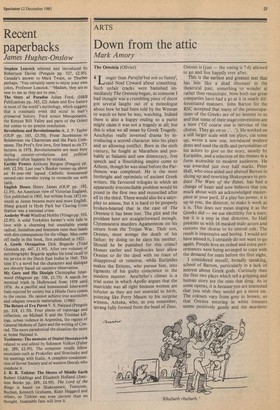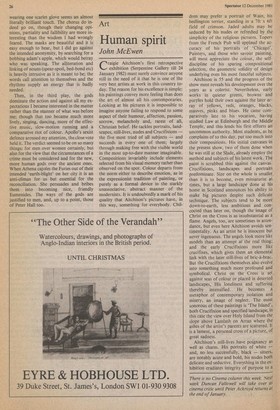Down from the attic
Mark Amory
The Oresteia (Olivier) T onger than Parsifal but not so funny', I said Noel Coward about something. Such unfair cracks were banished immediately The Oresteia began, as someone I had thought was a crumbling piece of decor got several laughs out of a monologue about how he had been told by the Woman to watch so here he was, watching. Indeed there is also a happy ending so a purist might claim it was not a tragedy at all; but this is what we all mean by Greek Tragedy. Aeschylus really invented drama by introducing a second character into his plays and so allowing conflict. Born in the sixth century, he fought at Marathon and probably at Salamis and saw democracy, free speech and a flourishing empire come to Athens, though he was dead before the Parthenon was completed. He is the most forthright and optimistic of ancient Greek writers. He favoured trilogies in which an apparently irreconcilable problem would be posed in the first two and reconciled after all in the third. There would also be a satyrplay to amuse, but it is hard to be properly broken-hearted that in the case of The Oresteia it has been lost. The plot and the problem here are straightforward enough. Clytemnestra murders Agamemnon on his return from the Trojan War. Their son, Orestes, must avenge the death of his father; by doing so he slays his mother. Should he be punished for this crime? Homer earlier and Sophocles later allow Orestes to do the deed with no trace of disapproval or remorse, while Euripides makes the Erinyes, who pursue him, into figments of his guilty conscience in the modern manner. Aeschylus's climax is a trial scene in which Apollo argues that the matricide was all right because women are inferior as they are not essential to birth, Pointing like Perry Mason to his surprise witness, Athena, who, as you remember, sprang fully formed from the head of Zeus. Orestes is (just — the voting is 7-6) allowed to go and live happily ever after.
This is the earliest and greatest text that has lain like a dead dinosaur in the theatrical past, something to wonder at rather then resuscitate. Now both our great companies have had a go at it in neatly differentiated manners. John Barton for the RSC accepted that many of the preoccupations of the Greeks are of no interest to us and that some of their stage conventions are a bore (`Of course one is nervous of the chorus. They go on so. . .'). He worked on a still larger scale with ten plays, cut some up, wrote a new one, introduced modern dress and used the skills and personalities of his actors to give us the story, mostly by Euripides, and a selection of the themes in a form accessible to modern audiences. He was awarded just over half marks. Peter Hall, who once aided and abetted Barton in slicing up and rewriting Shakespeare to produce The Wars of the Roses, has had a change of heart and now believes that you muck about with an acknowledged masterpiece at your peril. If a play has power, it is up to you, the director, to make it work as it is. This does not mean staging it as the Greeks did — we use electricity for a start; but it is a step in that direction. So Hall presents us with 16 masked male actors and restores the chorus to its central role. The result is impressive and boring. I would not have missed it, I certainly do not want to go again. People love an ordeal and extra performances were being arranged to cope with the demand for seats before the first night.
I considered myself, broadly speaking, school of Barton, particularly in a lack of interest about Greek gods. Curiously then the first two plays which tell a gripping and human story are the ones that drag. As in some operas, it is because you are interested that you wish they would get a move on. The colours vary from grey to brown, so that Orestes entering in white trousers seems positively gaudy and the murderer wearing one scarlet glove seems an almost literally brilliant touch. The chorus do indeed go on, though their changing opinions, partiality and fallibility are more interesting than the wisdom I had wrongly feared. The masks are beautiful and it is easy enough to hear, but I did go against the intended anonymity, by searching for a bobbing adam's apple, which would betray who was speaking. The alliteration and linking of nouns (spear-spoil, bed-bond etc) is heavily intrusive as it is meant to be; the words call attention to themselves and the rhythms supply an energy that is badly needed.
Then, in the third play, the gods dominate the action and against all my expectations I became interested in the matter rather than the manner of what was before me; though that too became much more lively, singing, dancing, more of the effective music, slow-motion running and a comparative riot of colour. Apollo's sexist defence aroused my attention, the close vote held it. The verdict seemed to be on so many things: for men over women certainly, but also for the view that the circumstances of a crime must be considered and for the new, more human gods over the ancient ones. When Athena cajoles the Furies out of their intended 'earth-blight' on her city it is an anti-climax for us but essential for the reconciliation. She persuades and bribes them into becoming nice, friendly Eumenides. The ways of the gods are justified to men, and, up to a point, those of Peter Hall too.







































 Previous page
Previous page